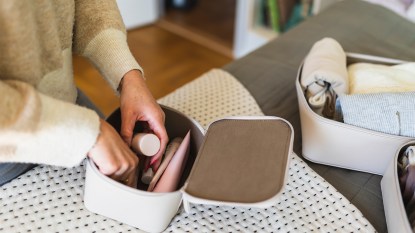Is SIBO Making You Tired? Take This Quiz To Find Out — And Discover The Yogurt That Can Cure It
Never heard of SIBO? Read on to learn more about this common issue.

If you frequently feel tired and sluggish for no apparent reason, or have been struggling with unexplained weight gain, a tricky condition known as small intestine bacterial overgrowth (SIBO for short) could be to blame. According to the Mayo Clinic, SIBO is caused by “an abnormal increase in the overall bacterial population in the small intestine — particularly types of bacteria not commonly found in that part of the digestive tract.” It can often happen as a complication of abdominal surgery, and it sometimes occurs alongside other health conditions. SIBO is a complex issue that is often underdiagnosed, and it may cause irritable bowel syndrome. Read on to learn more about SIBO, and if any of the symptoms described sound familiar, consider seeking medical attention.
Could you have SIBO?
An intestinal overgrowth could be causing your feelings of exhaustion. If you experience frequent fatigue and at least two of the following symptoms, SIBO may be the culprit.
- Foggy thinking
- Bloat
- Gas
- Upset stomach
- Diarrhea
- Skin rashes
- Blue moods
- Anxiety
- Muscle/joint pain
- Weight gain
‘Frankenbelly’ is fueling an epidemic of female fatigue.
SIBO occurs more often than you might think. “I refer to SIBO as ‘Frankenbelly’ because it’s a modern-day health monster,” says William Davis, MD, author of Super Gut. “Caused by a combination of factors, from processed foods to antibiotics to acid-blocking drugs, SIBO occurs when gut bacteria that belongs in the colon overgrows and spreads to the small intestine,” he says. And when toxins produced by the overgrowth enter the bloodstream, they cause fatigue, bloat, diarrhea, and more. The journal Clinical and Translational Gastroenterology describes SIBO as a “common yet under-recognized problem.” Doctors often miss it, so women can suffer symptoms for years.
Things are complicated by the fact that SIBO is often accompanied by SIFO, or small intestinal fungal overgrowth. That’s a problem since research shows that excess fungi in the intestines can trigger inflammation that worsens symptoms.
Doctors diagnose SIBO with breath tests. If tests identify overgrowth, antibiotics are typically prescribed. But Dr. Davis says if you have symptoms in the quiz above, the following steps can eliminate overgrowth and restore energy within four weeks.
- Replenishing good gut bacteria is key. But most probiotics don’t contain the bacteria that heals SIBO, warns Dr. Davis. That’s why he advises a daily dose of yogurt made with strains that do (as in the recipe below). Also key: Avoid foods that spur overgrowth, like sugary snacks, wheat, and corn.
- Antibacterial antifungal curcumin supplements can help. Dr. Davis advises taking 300 milligrams twice daily, doubling the dose over a week. It’s crucial that curcumin remains in the GI tract as long as possible, so pick a product that isn’t formulated to enhance absorption, like Thompson Curcumin (Buy from iHerb, $12.99).
Try the yogurt proven to cure SIBO
Yogurt has many health benefits, and adding homemade yogurt to your diet could help your gut. “A yogurt made with specific probiotic strains has eased SIBO symptoms in 90 percent of my patients,” says Dr. Davis. To make it, you’ll need a quart of organic half-and-half, potato starch, and a selection of probiotics.
Ingredients:
- 1 capsule Lactobacillus gasseri strain BNR17 (try: Dr. Mercola Biothin, Buy from Vitacost, $29.97)
- 10 tablets Lactobacillus reuteri strains DSM 17938 and ATCC PTA 6475, crushed (try: BioGaia Gastrus, Buy from Walmart, $28.99)
- 1 capsule Bacillus coagulans strain GBI-30,6086 (try: Schiff Digestive Advantage Daily Probiotic, Buy from Vitacost, $15.49)
- 2 tablespoons raw potato starch (try: Bob’s Red Mill Potato Starch, Buy from Vitacost, $3.79)
- 1 quart organic half-and-half
Instructions:
- In bowl, mix probiotics, starch, and 2 tablespoons half-and-half, stirring to remove clumps.
- Mix in remaining half-and-half. Cover lightly with plastic wrap.
- Set in yogurt maker or Instant Pot. Ferment at 106 degrees Fahrenheit for 36 hours.
- To make more, use 2 tablespoons curds or whey from original batch in place of probiotics above.
Dr. Davis advises enjoying half a cup daily for four weeks. Try eating it consistently and see if your symptoms improve. (Click through to discover more natural treatments for SIBO.)
This content is not a substitute for professional medical advice or diagnosis. Always consult your physician before pursuing any treatment plan.
A version of this article originally appeared in our print magazine, First for Women.













